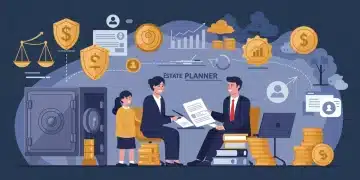Understanding 2025 tax laws and deductions for savings

Understanding 2025 tax laws and deductions allows small business owners to maximize savings, comply with regulations, and effectively plan for financial impacts on their operations.
Are you ready for the upcoming changes? Understanding 2025 tax laws and deductions is crucial for making informed financial decisions. Let’s dive into what you need to know to benefit this tax season.
Key changes in 2025 tax laws
As we look ahead to 2025, key changes in tax laws are set to impact many taxpayers. It’s important to stay informed about these modifications to make the most of your financial situation.
One of the significant changes involves the standard deduction. Starting in 2025, the standard deduction will increase, providing more tax relief for individuals and families. This adjustment will allow more taxpayers to benefit without itemizing deductions.
Changes to Tax Rates
Additionally, new tax brackets will be introduced, affecting how much you owe based on your income level. Understanding these brackets can help you plan your finances better.
- Increased tax rates for higher income levels
- Potential decreases for middle-income brackets
- New thresholds for capital gains taxes
With these tax rate adjustments, it’s essential to reassess your tax strategy. This may include altering investment choices or changing your withholding allowances.
Deduction Updates
Changes don’t stop at tax rates; several deductions will also see updates. For example, the child tax credit may undergo changes, allowing for enhanced benefits. Families should be aware of these shifts to maximize their credits.
- Expanded eligibility for certain credits
- Changes in retirement contributions
- Updates to healthcare-related deductions
By staying on top of these impending changes, you can make informed decisions regarding your taxes. It’s wise to consult with a tax professional or accountant to navigate the new regulations effectively.
Keep in mind that these adjustments aim to create a fairer tax system. Your proactive approach will ensure you’re prepared and can take advantage of any potential benefits coming your way in 2025.
Deductions every taxpayer should know

Understanding the various deductions available in your tax filings can significantly impact your overall tax burden. In today’s evolving tax landscape, knowing which deductions you qualify for is crucial.
Some common deductions include medical expenses, charitable contributions, and home office expenses. Maximizing these deductions can lead to more money in your pocket.
Medical Expenses
Taxpayers can deduct medical expenses that exceed a certain percentage of their adjusted gross income. This includes costs such as doctor visits, hospital stays, and prescriptions.
- Keep receipts and documents carefully.
- Know the threshold for deductibility.
- Include transportation costs related to medical care.
Tracking these expenses can be beneficial, especially for those with significant healthcare costs.
Charitable Contributions
Donations to qualified charities are deductible. Taxpayers can claim cash donations and the fair market value of donated goods. It’s important to ensure that the charity is qualified to maximize your deduction.
- Document contributions to avoid issues.
- Consider non-cash donations like clothing and vehicles.
- Research and choose reputable charities.
Every little bit counts when it comes to helping others while also reducing your tax liability.
Home Office Deductions
For those working from home, the home office deduction can be a game-changer. This deduction allows for a portion of your home expenses to be deducted if your workspace is used exclusively for business.
- Calculate square footage to determine the deduction.
- Include utilities and internet costs.
- Know the difference between regular and simplified methods of calculation.
Understanding these aspects can simplify your tax preparations and potentially save you a significant amount.
How to plan for tax season in 2025
Planning for tax season in 2025 requires careful preparation and knowledge of current tax laws. By being proactive, you can maximize your refunds and minimize your liabilities.
One effective strategy is to start organizing your financial documents early. Keep records of your income, expenses, and any potential deductions throughout the year. This organization will make tax season less stressful and more efficient.
Set Up a Budget
Creating a budget can help you save for potential tax payments. Assess your financial situation and determine how much to set aside. This can be especially important if you expect to owe taxes.
- Track your monthly expenses.
- Allocate funds for taxes throughout the year.
- Review your budget regularly to ensure you stay on track.
By budgeting effectively, you can avoid last-minute financial surprises.
Review Deductions and Credits
Familiarize yourself with the deductions and credits that will apply in 2025. Knowing what you can claim can significantly reduce your tax bill. Some common deductions include mortgage interest, student loan interest, and business expenses.
- Keep detailed records of deductible expenses.
- Consult IRS guidelines to stay updated.
- Consider tax software to maximize claims.
Being informed about these options can lead to substantial savings.
Consult a Tax Professional
Seeking advice from a tax professional can provide valuable insights. They can help you navigate complex tax laws and identify opportunities for savings. A professional can also assist with tax planning strategies specific to your financial situation.
- Schedule a consultation early in the year.
- Discuss your current financial status and plans.
- Ask about potential changes in tax regulations.
Working with an expert can ensure you are well-prepared for tax filing day.
Impact of new laws on small businesses

The impact of new laws on small businesses is significant as these regulations shape how businesses operate and grow. Understanding these changes can help small business owners stay compliant and competitive.
One major area affected is taxation. New tax laws often introduce changes in the rates or deduction eligibility for small businesses. For example, deductions that were previously available may change, making it essential for business owners to reassess their tax strategies.
Tax Rate Changes
Small businesses may see adjustments in their tax rates, which can directly affect their profitability. It’s vital to stay informed about any increases or decreases that can impact your financial planning.
- Review the new tax brackets annually.
- Consult with a tax advisor for tailored recommendations.
- Utilize accounting software to keep track of changes.
Understanding these changes helps business owners make informed decisions regarding their expenses and pricing strategies.
Deductions and Credits
New laws may introduce or modify existing deductions and credits for small businesses. Tax credits, such as those for hiring employees or investing in renewable energy, can provide significant savings.
- Research available credits and eligibility requirements.
- Keep documentation of qualifying expenses.
- Consider planning your business expenses around available deductions.
By leveraging these opportunities, small businesses can enhance their financial resilience.
Compliance Requirements
With new laws, businesses may face additional compliance obligations. This can involve more extensive reporting or new regulations that require changes in operational procedures.
- Stay updated with federal and state regulations.
- Invest in training or resources to ensure compliance.
- Implement systems to track compliance changes.
Failing to meet these requirements can lead to penalties, so proactive planning is crucial.
FAQ – Common Questions About the Impact of New Laws on Small Businesses
What are some key tax changes small businesses should watch for in 2025?
Small businesses should monitor changes in tax rates, potential new deductions, and updated compliance requirements that may impact their finances.
How can small businesses take advantage of available deductions?
By keeping accurate records of expenses throughout the year and consulting with a tax advisor, small businesses can identify and claim all eligible deductions.
Why is compliance important for small businesses?
Compliance is crucial as failing to meet legal and regulatory requirements can lead to penalties and fines that may harm a business’s operations.
Should small business owners consider hiring a tax professional?
Yes, hiring a tax professional can provide valuable insights and personalized guidance to navigate the complexities of new tax laws and ensure compliance.





